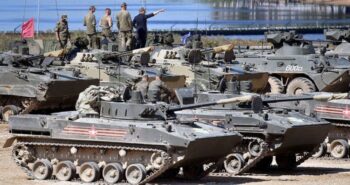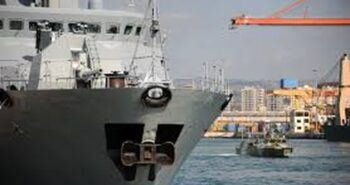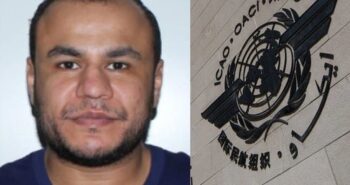By Tarek Megerisi
 Conflict in Libya has claimed the lives of tens of thousands, generated instability throughout North Africa and the Sahel, and become an increasingly pitched focal point for geostrategic competition.
Conflict in Libya has claimed the lives of tens of thousands, generated instability throughout North Africa and the Sahel, and become an increasingly pitched focal point for geostrategic competition.
.PART (II)
Escalation Ahead on the Eastern Front
“[U]nless nonaligned states can protect and support the UN to launch a genuine political process, the external actors engaged in Libya’s civil war will continue escalating.”
The war in Libya is set for a dramatic escalation. Given Haftar’s disadvantages in western Libya and the considerable Turkish support therein, Haftar is unlikely to make further gains and is already growing increasingly reliant on artillery just to maintain his positions.
As the situation in western Libya worsens for him, he is likely to refocus his remaining offensive capacity on the de facto eastern front between the cities of Misrata and Sirte.
However, further east, where Turkish air defenses are not present, he will likely remain unbreachable and comfortably absorb attacks by a GNA that is desperate to regain the country’s oil terminals.
As the war drags on, Europe has become more anxious at the potential destabilizing consequences of an internationalized conflict in its immediate backyard, potentially precipitating a new surge of refugees.
The active role of France, however, blunts the multilateral instruments—the EU and UN—that Europeans are most comfortable using. Meanwhile, the United States, which Europe is accustomed to depending on for any force projection, appears unwilling to engage in another intractable conflict, let alone one where allies such as the UAE and Turkey are in direct opposition.
It is almost inevitable that the UAE will seek to regain the upper hand through further deployments of mercenaries and weapons shipments. More crucially will be its attempts to regain aerial superiority from Turkey, which could involve importing Israeli air defenses following the inability of Russia’s Pantsir system to effectively neutralize Turkey’s drones.
Further severe losses could lead to the introduction of advanced Emirati and Egyptian aircraft. This would be a dangerous escalation that Turkey already seems to be preparing for with training drills involving its own F-16s in the Mediterranean.
All these developments point to an escalation of the increasingly destructive conflict. The removal of Haftar from western Libya may begin a new and perhaps more difficult campaign to dislodge the LNA from Libya’s oil fields in the south and oil terminals along its eastern coastline.
More worrying for Libya’s future would be if Haftar moves to deepen the partition of the country in response to his military weakness. This could be done by trying to once again sell oil illicitly if he believes there will be no international pushback this time around.
Unless nonaligned states can protect and support the UN to launch a genuine political process, the external act ors engaged in Libya’s civil war will continue escalating their attempts to seize control of this desert country that promises much yet delivers little more than squandered resources and frustration to its would-be overseers.
Supporting the UN and Avoiding Protracted Conflict
At its core, Libya’s war has been driven by the aspirations of regional powers, following their hijacking of the Libyan transition. These actors are now vying to reshape the region in their own image in a dangerous race to the bottom.
Following are priority areas for policy action to reverse this trend and avoid an extended conflict in Libya.
Recognize the UN as the best honest broker.
The escalation of the conflict by external actors means there are more interests and reputations at stake than there were previously. Given the relatively low costs each of these actors is incurring by supporting proxies, they have the means and incentives to continue escalation.
By recognizing the UN as the best body to facilitate a de-escalation and negotiated settlement, all sides will have greater assurances that their interests will be considered.
This reduces the “winner-take-all” undercurrent that has been driving the geostrategic aspects of this conflict. It is also the only option whereby Libyans will have the opportunity to reassert their sovereignty rather than existing as a vassal state to other regional actors.
Stop treating Haftar as a viable alternative.
The impossibility of Haftar winning this war and being capable of ruling Libya has been made painfully clear with the GNA’s April 2020 offensives led by Turkey.
Even before that, the scale of the mobilization triggered against him, his lack of a strong domestic constituency, absence of legitimacy, and his reliance on foreign mercenaries, equipment, and aircraft indicates that Haftar’s best case scenario would be a prolonged urban war that would destroy Tripoli and only set him up for further conflicts in cities like Misrata.
Having scuttled previous efforts by the UN and then launching an assault on the capital after agreeing to a power-sharing deal with Sarraj in February 2019, Haftar has proven himself an unreliable negotiating partner.
Moreover, he has made his ambition to be Libya’s next authoritarian leader abundantly clear on multiple occasions and violated every ceasefire offered, including the terms of the January 2020 Berlin Conference.
Haftar, accordingly, seems to be the ultimate spoiler to de-escalation and stabilization in Libya. While Haftar is often treated as an essential part of a solution, in fact, a resolution to the conflict would be far easier by not treating him as the governing equivalent of the GNA. Better prospects can be realized by engaging those under him in order to enforce a ceasefire and build a joint security institution.
Display a unified European policy for the conflict in Libya.
The lack of a unified European position on Libya has enabled Russia to gain leverage and expand its influence on Europe’s southern flank. This poses a far more serious threat to Europe than any intra-European differences.
Russia’s deepening involvement in Libya, accordingly, should be a rallying point for EU and NATO members.
This does not necessitate partisan involvement in Libya’s war, but rather a common policy position from the West that enforces the UN arms embargo, defends international norms, upholds the integrity of Libya’s National Oil Corporation as the sole legitimate seller of Libyan oil, and ring-fences the UN process as the only game in town.
This would significantly constrain Russia’s operation enacted through mercenary groups, arms transfers, and attempts to help Haftar sell oil illicitly. Not only would this make Russia’s involvement more costly for Moscow but it could also block further Russian expansion and counter the inroads Russia has already made.
Enforce international norms to stop the escalations.
The violations of the UN Security Council-mandated arms embargo on Libya are a central driver of the conflict and allow Libyan belligerents, especially Haftar, to ignore calls for a ceasefire with impunity.
Using assets such as the EU’s Operation IRINI as well as other satellite and aerial monitoring is a quick way to gather evidence on all violations that can be used to enforce the arms embargo in an unbiased fashion.
If trying to hold violating states, such as the UAE, accountable is considered too politically sensitive, or if the Security Council is too divided to act, then other options remain available. A clear message can still be sent through unilateral sanctions on the private companies used by the UAE and others to send arms.
Additionally, those who run private military contractors such as Yevgeny Prigozhin’s Wagner Group could also be sanctioned in an attempt to create an environment in Libya that is more conducive to peace.
A pressure campaign of this sort can also be applied to Libyan belligerents who seek to undermine the UN process. Similar sanctions in 2014 against the heads of rival parliaments and governments were considered key to facilitating the talks that birthed the Libyan Politic al Agreement and the GNA.
Libyan actors and external governments that are attempting to undercut the UN process persist in doing so because they bear little cost to themselves. Moving to end this culture of impunity would be a relatively peaceful way of altering behaviors.
Make a national ceasefire more resilient through local ceasefires.
The decentralized nature of Libyan society and the various militias that comprise both rival coalitions means that a national ceasefire can only be made resilient by engaging the communities actually fighting.
Focusing on “local ceasefires” between directly warring communities such as Misrata and Tarhouna is a key step toward preventing the reemergence of conflict and starting to construct truly national security institutions in Libya.
Working from the local level up is vital to alleviating the insecurities of communities that otherwise create openings for nefarious foreign involvement and building resilient institutions that can better resist foreign influence.
***
Tarek Megerisi is a policy fellow with the North Africa and Middle East program at the European Council on Foreign Relations, specializing in politics, governance, and development in the Arab world. He has worked extensively on Libya’s transition since 2012 with Libyan and international organizations.
_____________
![]()




